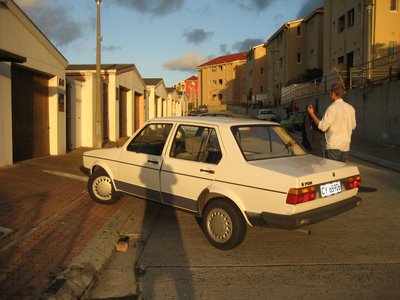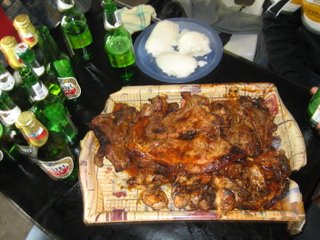
Posted by Mikkel
Hi there everyone. Hope you are doing well and a big “thank you” for all the positive comments to this sight. This time I didn’t really know where to start…so any kind of suggestions on what you want us to write about next time are warmly welcomed. For now I’ll try to give you an idea of our life here, exemplified by two different parties: one a football gathering with my new team mates and the other a traditional African party in Guguleto township.
Last week my football team (“Team Evil”) secured promotion by winning 3-2 in one of the last matches of the season. It was a Wednesday so no big celebration was called for, but half of the team gathered at a team mate’s house situated on the hill overlooking the center and harbour of Cape Town. We ordered pizza and had a couple of beers while talking and watching CL football. I would have liked to show you photos, but Erick brought me straight from the football pitch to his house. An interesting ride by the way due to the combination of his new ‘Mini’ and his Schumacher tendencies! It did become a rather weird gathering though. Two guys went to another room where the playstation was set up and three guys took out their laptops and started chatting and emailing. A few other people were smoking on the balcony. Two of them had been to the World Cup in Germany and they showed me some of their photos from the trip.
The second party was in the township of Guguleto. An African party is not just a party in Africa. It is a traditional party honouring the ancestors and held on rare occasions. In our particular case it was at Mlamni’s place in Guguleto. His mother had decided that it was time to honour the ancestors and in particular her own mother who had died 11 years ago. This African party included African beer (the most positive thing I can say about African beer is that it doesn’t really resemble beer, see for yourself!),

food, greetings to the ancestors, more African beer, brandy, more greetings, more African beer, more brandy again, normal beer and whatever other kind of drink that materialized…and more of it! The guests (a mix of family, neighbours, friends and whoever happened to come by) were divided according to age (and respect) and gender. The women were inside the house; the older respected men – the elders - in a small circle of ad-hoc benches in the backyard (se photo at top) and the younger men in another group next to the elders. In the front there seemed to be a left-over crowd of young people but since I ended up with the elders I would not know so much about who and what went on there.
I was being seated with the elders, which caused some raised eye brows from the younger men [read: my age] in the other circle. One guy was even a bit aggressive until I managed to let him know that I was a visitor from Denmark, that I felt very honoured and privileged to sit with the elders and that I was definitely not a white South African. He knew Peter Schmeichel and I explained how Zuma scored the best goal in the Danish league in 2003…and everything was OK!

All across the world older people seem to be complaining about the “youth of today”…this seems to be the case also in South Africa: According to the elders the youngsters sitting just next to us (se photo) were “disrespectful”; they were “gangsters and robbers” and they were “careless about the old ways.” While the elders were telling me this in one ear, the young men were telling my other ear that the elders were grumpy old men and that I should come and sit with them!
In between all the drinks several of the elders were kind to tell me all about the rituals, what they said when they greeted the ancestors, what made someone an elder, how I was supposed to do if I did not want to drink when it was my turn (a very useful piece of knowledge that I could have used earlier!) and much more. The neighbour’s son who was around my age, but (like everyone else in Guguleto) still lived at home went to find his world map so I could point out Denmark to him. He told me how he liked looking at the map, planning where he wanted to go “one day”. He had no clue if he would ever succeed, but the will was definitely there.
People got drunk and became more and more rough and even slightly abusive (so I heard from Mette and Janine). Suddenly one guy asks if I know that he is a singer. Before I can answer he has already begun his song constantly looking at me. After two minutes of singing he tells me that he wrote the song himself and demands my opinion: do I think he can make a career as a singer? The party started around two in the afternoon, we left around six and although I really enjoyed the party, it was also a great relief to leave all these drunk, loud, and rough “brothers and comrades” behind.
Why am I telling you all this? I hope these two parties can give you an idea of some of the different worlds we are part of here. And somehow I must admit that I do not feel completely at home in neither of the places. In the township people are warm, open and welcoming, but they also give me the urge to justify or excuse my own situation. I explain that it was a very cheap car we bought, that we were so lucky to rent the house we are living in and that my university gave me a grant that made it possible for me to come here. When the neighbour at the African party showed me the places on the map he wanted to visit, he highlighted South America, USA and Australia…as you can guess I did not respond with a “been there done that!” And just as much as the people in the township are warm and welcoming they are also very much in your face, constantly grapping or addressing you in order to tell you something about their life.
And with the people from football (who all happens to be white by the way…just if you hadn’t already guessed that) we talked about the last time they went to Europe. How one guy had only had 2 days in Prague, but planned to stay longer next time. We talked about what a great house it was, and how we are going to have pool parties in his garden when the summer sets in. We talked about music, Champions League, girlfriends and the jobs the guys are having. All of it stuff I can definitely relate to. But most of the time, people were busy watching television, playing play-station or chatting on their computer. To some extent, so I admit, I was bored.
I also keep having this uneasiness about the way they take their lifestyle for granted (just as much as I do in Denmark). I don’t know what I expected; perhaps some sense of recognition of the privileges they still enjoy due to past injustices? Actually I don’t know anymore. Is it really fair that I want South Africans whites of my age to walk around feeling bad for owning a car, having a good education and living in a nice house?
I think you had more than enough now so I leave you (and myself) with these questions...








 Comfortable view
Comfortable view These kids (and a lost drunk mother) are dancing "pantsula", one of the hottest dances in the townships. We were invited to this streetparty by Siswe.
These kids (and a lost drunk mother) are dancing "pantsula", one of the hottest dances in the townships. We were invited to this streetparty by Siswe.










